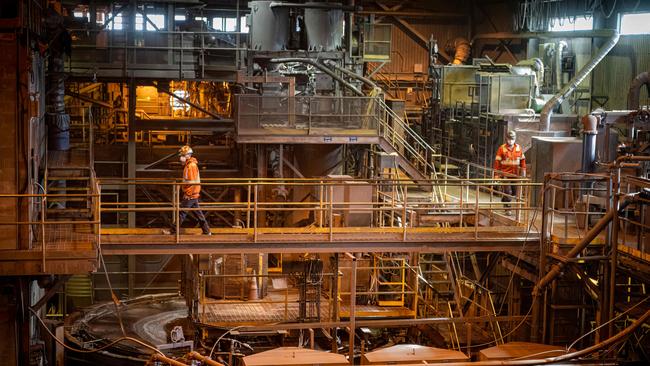
One line that highlighted the imminent danger to Australia’s highly productive mining sector and the broader economy, courtesy of the Albanese government’s reckless industrial relations changes. “Increasing delegates’ capacity … will empower them to navigate the Fair Work Act’s complex rules concerning initiating and participating in bargaining, the forms bargaining may take, and provide information on taking protected industrial action.”
That is union speak for a simple black-and-white scenario: More union delegates will enable the union to organise more industrial action. More strikes. More stoppages. This has always been the foremost objective of the unions’ push to give greater power, position and say to union delegates within Australian workplaces; a long-held union demand that was rubber-stamped by the Albanese government earlier this year, despite the clear and alarming consequences for businesses, large and small.
Under the changes advocated by the MEU – which the Fair Work Commission will ultimately rule on – union delegates will be given the right to spend as much of their time at work engaging in union activities as they please, while still being paid by the business. Union delegates will be entitled to “a particular shift, roster or other flexible work changes where necessary to facilitate the exercise of their right to represent during work hours”.
They will be entitled to “be released from normal duties for the purpose of the workplace delegate participating in bona fide union business”.
Attending a union or branch meeting at the weekend? The employer must pay for the hours, including loadings and overtime. Heading to a union conference for five days? The employer must pay the travel and provide holiday loadings.
This is an absurd overreach of union power. But perversely, it will create a two-tiered class system among Australian workers: those who actually work for the business, and those who work for the union but get paid by the business to do so.
This will enshrine the rights of some workers to do whatever they please, with businesses powerless to stop them. Before the Albanese government rushed its IR legislation through the parliament, the business community warned of some of the perverse outcomes of such rash changes. But this alarming push from the unions is beyond even the worst expectations. It is a green light for the unions to disrupt and control every workplace across the country. The consequences of such unprecedented union powers are clear: businesses will be less productive and more costly to run, with Australian households hit with higher cost of living.

Perhaps even more alarming than the obvious hit to productivity will be the ability for unions to grow their base of delegates. Under the MEU plan, there is no cap on the number of union-affiliated workers who can be designated as union delegates, and thus receive the incredible swag of over-the-top entitlements no other workers receive.
There are early indications that unions will push for as much as 10 per cent of union members on any particular worksite to be classed as delegates.
Imagine losing 10 per cent of your workforce at any given time, so delegates can attend to union business? Imagine paying for 10 per cent of your regional workforce to attend union meetings or dispute resolution meetings in a capital city?
Of course, this perverse overreach is not limited to mining. If set in stone by the FWC, the extended power of union delegates will be applicable to all industries in what would be a considerable blow to productivity across the country. How does a small business deal with that extra cost; paying workers to do union activity and not core business; paying workers an extra week of leave so they can attend conferences?
For Western Australia in particular, this power grab from the unions has a deeper ulterior motive; made abundantly clear in the footnotes of the MEU’s submission. To back up its arguments for a rapid expansion of union delegates and their powers, the MEU cites one expert witness: the union’s own national organising and training director.
This official has spoken routinely about his strategy to “reunionise the Pilbara”, with his witness statement illustrating how the MEU intends to use delegates’ rights to achieve this goal.
The stakes could not be any higher for that state’s mining sector, which has enjoyed relative peace from disruptive and damaging industrial actions that have the potential to wreak havoc on the state’s economy, given its intrinsic links. Australian mining companies are already feeling unprecedented cost pressures, courtesy of the Albanese government’s raft of industrial relations changes, mounting energy prices, exhaustive environmental approvals processes (and the threat of more) and increased royalties.
The combination is having a sustained impact on the global competitiveness of our most productive, job-creating companies, forcing much needed investment to head offshore to low-cost jurisdictions with poor environmental and emissions standards.
Having unions run amok in the Pilbara – with every business footing the bill – will only make matters worse. For the entire nation.
Tania Constable is chief executive of the Minerals Council of Australia.




It was only one line; one jumbled reference, buried deep within the Mining and Energy Union’s submission to the Fair Work Commission, that completely gave the game away.